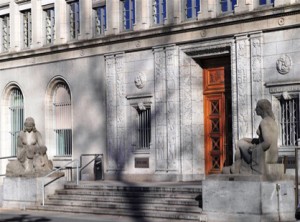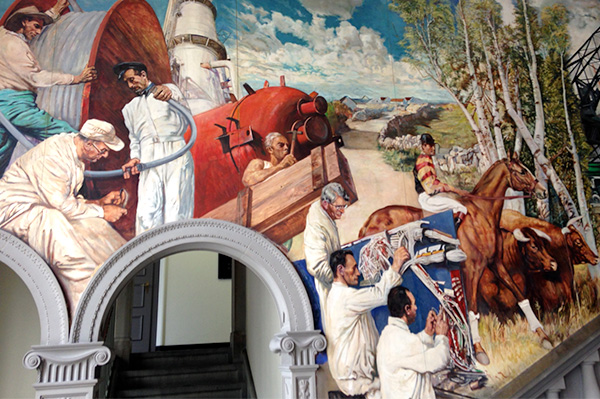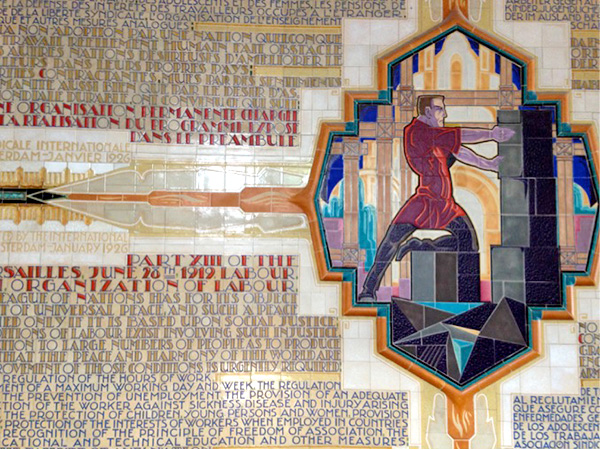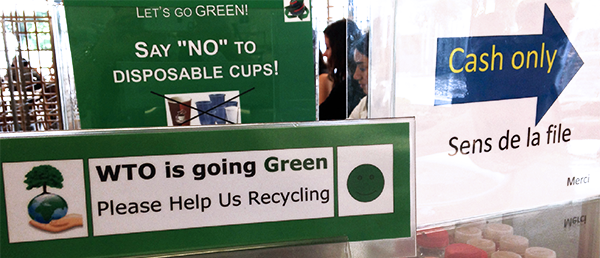By David Winickoff, ESPM Professor
This summer, with only a rushed coffee for breakfast, I found myself in the glass guard station in front of the World Trade Organization. Housed in a 1920s rendition of a classical Florentine villa, the main WTO building looks out over a sloping garden to the ultra blue Lake Geneva, resting between the French and Swiss Alps. I had a twinge of anxiety. This was, after all, one of the most powerful and opaque economic institutions in the world and I had the chance to enter its guarded doors. While many natural scientists in ESPM find themselves doing research in marshes, forests and grasslands, here I was doing “fieldwork” within a powerful social and legal institution.
In fact, many social scientists in ESPM do on-site fieldwork. This is one way that we attempt to understand better the interconnections among environment, norms, culture, and power. In my own work, I tend to conduct interviews, observe meetings, and read a lot of laws. A stream of my research focuses on the question of how international trade law facilitates or inhibits global environmental goals like mitigating climate change, promoting the sustainable use of natural resources, and helping ensure environmental justice. National environmental regulations can be at odds with the free trade agenda because they potentially place burdens on importers to establish products that conform with domestic environmental rules. In fact, social regulations of all kinds, whether environmental, labor related, or health related, are called “non-tariff barriers to trade.” Trade law makes certain exceptions for environmental regulations, but the boundaries of legality are not clear and often depend on science and technical arguments. Drawing on the fields of science and technology studies (STS), bioethics, and the law, I am particularly interested in the role of science and experts as they are used and misused in working out the tensions between the goals of free trade law and sustainable development.

World Trade Organization, main entrance. Image courtesy of the WTO website.
My specific focus that day was biofuels: how would science be used to arbitrate an emerging trade war between Europe and a number of developing countries about ethanol biofuels? I have a National Science Foundation grant to help me find out. The European Union passed a law in 2009 that produced a set of sustainbility criteria for the use of biofuels in its member states. Only countries using “sustainable” biofuels would get credit towards a new requirement that 10% of each country’s transport sector be converted to renewable sources. Europe’s biofuel sustainability standards take into account greenhouse gas savings and the protection of biodiversity, seemingly noble goals for an environmentalist agenda. But a number of importing countries think that Europe is using these criteria to protect its own domestic biofuels industry and that these criteria don’t accomplish their stated objective. At issue is the legitimacy of technical calculations like life cycle assessment, which seeks to estimate the total carbon footprint of producing a biofuel. Argentina feels that its biodiesel has been unfairly labeled as unsustainable, and thus is bringing a case against the European Union.
The biofuels dispute is the latest in a series of cases in which the fundamental compatibility or incompatibility of trade law and the agenda of “sustainable development” is being worked out. The WTO Secretariat, in fact, describes sustainable development as a central goal in the founding charter of the WTO. But WTO law has already been used to challenge other environmental laws, such as U.S. laws seeking to protect sea turtles from certain shrimp trawling boats (laws were upheld with certain conditions), and E.U. measures restricting the importation of GMOs (measures found in violation of law).
That day at the WTO, I was set to interview officials about the biofuels case. My host, an officer in the organization’s Secretariat, brought me up a finely constructed staircase and down a hallway lined with offices painted in very light gray. My first interviewee, a member of the Committee on Trade and Environment (a subcommittee of the WTO’s Seretariat) began to explain what her group had been doing on biofuels. She explained that while biofuels had not explicitly been discussed in her committee, carbon footprinting had been on the agenda since 2001. But nothing tangible had been done on the issue. I came away from my interview thinking that the Committee on Trade and Environment hadn’t made much progress: countries seemed more interested in talk than action.
After a series of interviews trying to get to the heart of the matter, it was time for lunch. I started wandering towards the cafeteria. Descending another staircase, I discovered a beautiful set of murals and art deco mosaics. They seemed to be celebrating labor.

All following photos by David Winickoff.
This seemed strange to me, given that labor and free trade are often seen to be at odds. In fact, it’s a sore spot among labor rights advocates that WTO law doesn’t seem to recognize as legitimate many laws that try to promote good labor standards.

Sometimes discoveries in the field are serendipitous. With my curiosity piqued, I had to do some research on the WTO’s website to get to the bottom of these beautiful art works. It turns out that the WTO building, Centre William Rappard, originally housed the International Labor Organization! It moved out to make room for the WTO predecessor organization in the late 1970s. The Florentine mansion is, in other words, an architectural irony. The ironies multiplied as I made my way to the cafeteria located on the ground level. I was delighted by the handsome spread in the salad bar. As I brought my salad to check out counter, I found myself staring at this sign:

I had audible chuckle. A man in a black suit looked back at me uneasily. It didn’t fill me with confidence about the global financial situation that the WTO only took cash. Worse: was “saying no to disposable cups” really the way the WTO was going green? Transformative change is necessary. The WTO must sharply shift course, and fast, in order to limit the “chilling effect” that its laws have on environmental governance and to use its economic power to generate environmental cooperation. My research hopes to make the case that the WTO and its countries must do better.
